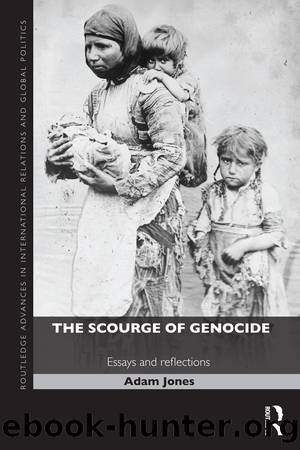The Scourge of Genocide: Essays and Reflections by Adam Jones

Author:Adam Jones [Jones, Adam]
Language: eng
Format: epub
Tags: International Relations, Diplomacy, General, Political Science, Security (National & International)
ISBN: 9781135047153
Google: INwyX-ZKsVsC
Goodreads: 20787708
Publisher: Routledge
Published: 2013-06-26T00:00:00+00:00
Figure 13.2 Women gather at village well. Dori, Sahel region, Burkina Faso.
it is a genocide perhaps 10 times greater than Darfurâs and more than twice as large as Rwandaâsâ¦Genocide is not a word one should use hastily, but the situation is exactly as described in the UN Convention on Genocide, which defines it as âdeliberately inflicting on the group conditions of life calculated to bring about its physical destruction in whole or in partâ⦠Mugabeâ¦[has] already been responsible for far more deaths than Rwanda suffered and the number is fast heading into realms previously explored only by Stalin, Mao and Adolf Eichmann.41
David Coltart, a member of Zimbabweâs opposition Movement for Democratic Change, claimed that âZimbabwe has the lowest life expectancy in the world: 34 for women and 37 for men,â and that Mugabeâs tyranny had rendered him culpable for the countryâs structural collapse. âTo use a legal term, I would say this amounts to genocide with constructive intent. In terms of a complete disregard for the plight of people, not caring whether there is wholesale loss of life, it amounts to genocide.â42
Economic sanctions and embargo
The structural dislocation associated with punitive economic actions, and the mass mortality allegedly caused by them, have hovered at the margins of comparative genocide studies since the beginning of the 1990s. It was at that point that the United Nations Security Council, led by the United States and Great Britain, imposed sanctions on Iraq as punishment for its May 1990 invasion of neighboring Kuwait. The destruction of civilian infrastructure caused by the ensuing Gulf War âwrought near apocalyptic results on the economic infrastructureâ of Iraq, in the estimation of a March 1991 UN report. The mixture of sanctions and war had returned Iraq to a âpre-industrial age but with all the disabilities of post-industrial dependency on an intensive use of energy and technology.â43 The 1996 International Court on Crimes Against Humanity Committed by the UN Security Council on [ sic ] Iraq, headed by former US Attorney General Ramsey Clark, charged and found that:
The United States, its President Bill Clinton and other officials, the United Kingdom and its Prime Minister John Major and other officials have committed genocide as defined in the Convention against Genocide against the population of Iraq including genocide by starvation and sickness through use of sanctions as a weapon of mass destruction.44
In December 1996, after more than five years of unparalleled privation, the âOil for Foodâ program was established, ostensibly to alleviate the worst of the damage caused by sanctions, to allow the Iraqi regime to purchase essentials for the population through carefully managed oil sales and disbursements of revenue. However, two successive overseers of the program resigned, and both subsequently adopted the framing and vocabulary of genocide to denounce what was occurring under the sanctions regime.45
In her 2010 treatment, Invisible War: The United States and the Iraq Sanctions, Joy Gordon stated her belief âthat the sanctions on Iraq [do not] constitute genocide or crimes against humanity, as these are defined in
Download
This site does not store any files on its server. We only index and link to content provided by other sites. Please contact the content providers to delete copyright contents if any and email us, we'll remove relevant links or contents immediately.
Machine Learning at Scale with H2O by Gregory Keys | David Whiting(4268)
Never by Ken Follett(3890)
Harry Potter and the Goblet Of Fire by J.K. Rowling(3818)
Unfinished: A Memoir by Priyanka Chopra Jonas(3359)
Fairy Tale by Stephen King(3315)
The Man Who Died Twice by Richard Osman(3046)
Will by Will Smith(2883)
Rationality by Steven Pinker(2332)
Can't Hurt Me: Master Your Mind and Defy the Odds - Clean Edition by David Goggins(2288)
The Dark Hours by Michael Connelly(2285)
It Starts With Us (It Ends with Us #2) by Colleen Hoover(2272)
The Storyteller by Dave Grohl(2205)
Friends, Lovers, and the Big Terrible Thing by Matthew Perry(2188)
The Becoming by Nora Roberts(2166)
The Dawn of Everything: A New History of Humanity by David Graeber & David Wengrow(2164)
The Stranger in the Lifeboat by Mitch Albom(2097)
Cloud Cuckoo Land by Anthony Doerr(2067)
Love on the Brain by Ali Hazelwood(2031)
Einstein: His Life and Universe by Walter Isaacson(1991)
